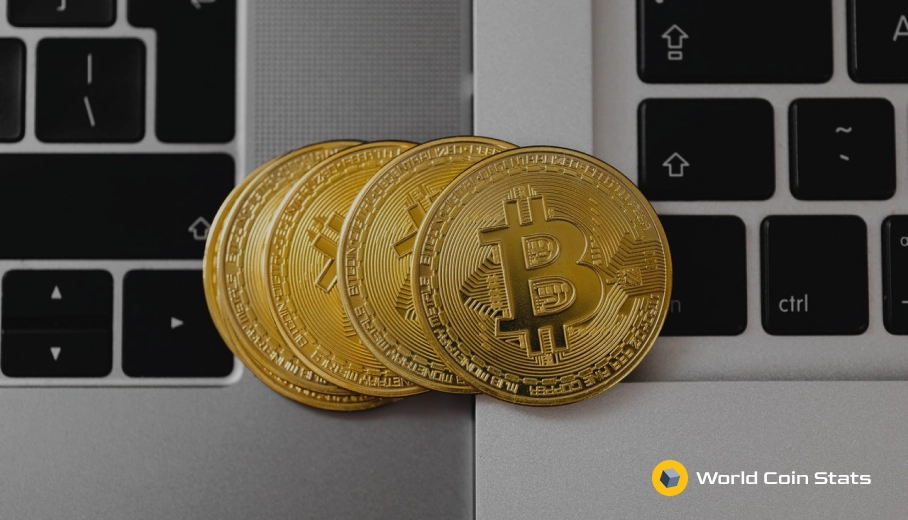Is the Bitcoin ETF going to be fully backed by Bitcoin?
Bitcoin has made headlines again. This time it surrounds the SEC’s decision to allow the creation of a Bitcoin ETF.
This has raised a lot of questions about a Bitcoin ETF and how it works. One of those questions concerns the backing of the ETF. Is a Bitcoin ETF fully backed by Bitcoin? Or is there something else backing it?
The answer to this question varies depending on the ETF. At the moment, the only Bitcoin ETF that has been approved is a Bitcoin futures ETF – ProShares Bitcoin Strategy ETF.
A Bitcoin futures ETF does not have a full Bitcoin backing. Instead, a futures Bitcoin ETF will track Bitcoin futures contracts from the Chicago Mercantile Exchange.
Anyway, this article will cover everything you need to know about Bitcoin ETFs and their backing.
What Is an ETF?
An ETF is an exchange traded fund. ETFs exist for all kinds of different assets, groups of assets, and their derivatives.
For instance, you can purchase an ETF that only holds shares of environmentally friendly companies. If the price of the basket of shares goes up, then the value of your ETF share goes up in value as well.
It’s a simple concept to understand when it comes to stocks.
Of course, ETFs also exist for assets like gold and silver. In those cases, the ETF will hold the underlying asset and sell shares that generally equate to 1 gram per share. If the price of gold goes up, then the value of the ETF goes up.
ETFs can also track derivatives like future contracts. Futures ETFs are much riskier because they track a speculative derivative like a futures contract. A futures ETF is also not backed by an underlying asset – it’s only backed by a synthetic derivative.
The Regulatory Problem With Bitcoin ETFs
Bitcoin ETFs have a lot of regulatory problems that the Securities and Exchange Commision (SEC) has cited as a reason for denying cryptocurrency ETFs in the past. For those that do not know, there have been a lot of cryptocurrency ETF applications over the years and all but one of them has been denied by the SEC.
The SEC has cited the following issues with approving a cryptocurrency ETF.
Custody and Regulation
The first problem the SEC has with a Bitcoin ETF surrounds custody of the Bitcoin. As you should know by now, Bitcoin requires more custody work than a regular stock.
Basically, the security of the private keys must be extremely high in order to prevent any hacking or the like.
This was a bigger problem in 2018. Fortunately, it has become less of a problem with the emergence of Bitcoin custodian services like Gemini and Coinbase.
That said, the SEC still does not like the custody issues surrounding Bitcoin and has been hesitant to approve an ETF that holds Bitcoin for that exact reason.
Cryptocurrency Exchanges
Cryptocurrency exchanges are much less regulated than stock exchanges and brokerages. The concern the SEC has with approving a Bitcoin ETF is that cryptocurrency can easily manipulate the price of Bitcoin.
More importantly, it is not actually illegal to manipulate the price of Bitcoin because it’s an unregulated asset. In other words, it is perfectly legal for a cryptocurrency exchange to manipulate the price in order to wipe out leveraged traders.
The concern the SEC has is that the exchanges will collude with bad actors in order to manipulate the price of Bitcoin and in turn manipulate the price of the ETF.
Unfortunately for the future of a Bitcoin ETF, there does not appear to be any way to fully regulate cryptocurrency exchanges because cryptocurrency exchanges can appear in any jurisdiction. For instance, a Russian cryptocurrency exchange could appear that manipulates the price of Bitcoin and the SEC could not do anything about it because it falls outside their jurisdiction.
Low Liquidity
The final issue with a Bitcoin ETF that holds Bitcoin is that the SEC claims Bitcoin has low liquidity.
This was more of a problem a few years ago when the first Bitcoin ETFs were being submitted to the SEC. These days Bitcoin has about $30 billion of trading per day, which is a decent amount of liquidity.
However, it is still relatively small when compared to other ETFs, so the SEC is hesitant about approval.
Bitcoin’s liquidity will likely increase over time as it becomes more popular. This is one issue the SEC has with Bitcoin that will likely get resolved at some point in the future.
It’s Better To Hold Your Own Bitcoin
All the talk of Bitcoin ETFs has people excited to purchase a Bitcoin ETF. First of all, the ETF is a futures ETF, so it has no underlying Bitcoin.
A spot Bitcoin ETF will probably be approved in 2022, though. And it’s still a really bad idea to buy a Bitcoin ETF because it’s so easy to purchase and store your own Bitcoin.
Here are some reasons why it’s much better to hold your own Bitcoin rather than owning a Bitcoin ETF.
You Control The Hacking Risk
The best part about holding your own Bitcoin is that you control the hacking risk. You do not have to rely on a big corporation to protect your assets.
The corporation has an incentive to protect your assets, obviously. But enough notable exchange hacks have occurred due to negligence by employees that we find it risky to place a large sum of Bitcoin on a cryptocurrency exchange.
In reality, the risks of someone hacking your Bitcoin wallet are near zero if you follow proper security measures. The basics of it are to use a Trezor hardware wallet, write down your private words on a piece of paper (or etch them in metal), and store the keys in a safe place.
Once you do that, never type your private keys into a computer unless you are recovering your wallet. There is no reason to type in your private words, period. Anyone asking for your private keys is a scammer.
That’s about it for keeping your Bitcoin secure. It is not a particularly complicated process for anyone with a basic understanding of technology and some common sense.
Plausible Deniability
The other benefit with keeping your Bitcoin in self-custody is that you have plausible deniability about its existence. We will not cover why you may want to deny that you own Bitcoin, but there are more reasons that you would want to keep your cryptocurrency ownership private.
In fact, there are not any benefits to having anyone (or any organization or government) know that you own cryptocurrency. It can only hurt you if people know you own cryptocurrency.
Sadly, if you use a custodial service to store your Bitcoin, then that service will know that you own Bitcoin and the exact amount. That company will also report that you own Bitcoin to the government.
On the other hand, self-custody has enough plausible deniability surrounding it that you are ok. Remember, people have lost the keys to their Bitcoin wallet in a boating accident in the past.
Closing Thoughts
That covers it for whether or not the new Bitcoin ETF will be fully backed by Bitcoin.
Unfortunately, it will not be fully backed by Bitcoin because it is a futures ETF rather than a spot ETF. There are pending applications with the SEC for a spot Bitcoin ETF. It remains to be seen whether those applications will be approved, but industry experts believe that a spot Bitcoin ETF could be approved in mid-2022.




